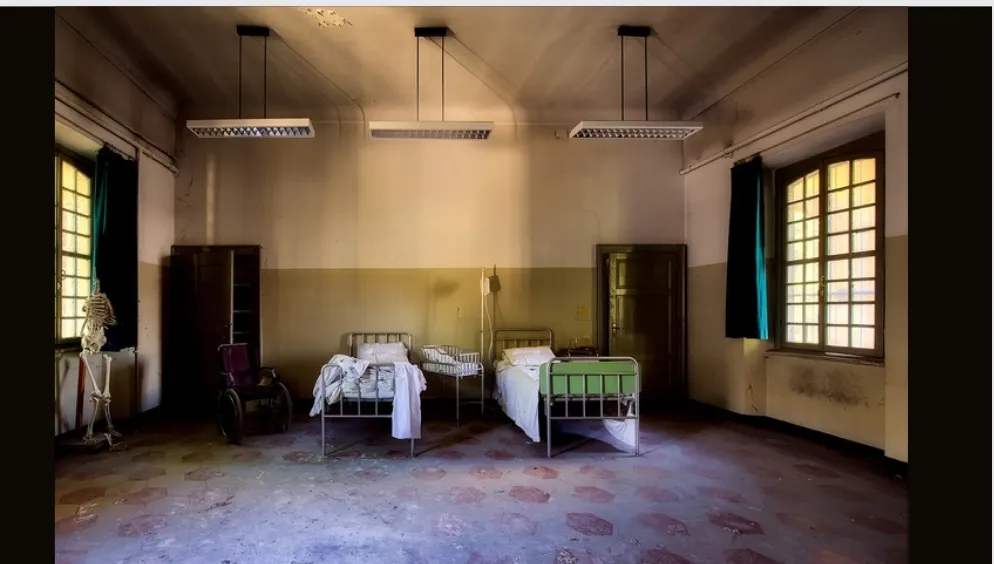 [Pixabay] cortesía de
[Pixabay] cortesía de12019

Vivir en Venezuela desde hace algunos años ha sido bastante complejo. Cada quien desde su experiencia de vida le da una descripción muy personal de cómo se vive o de lo que se vive en el país, acá desde mi perspectiva existen dos realidades: una realidad son aquellos a quienes sus ingresos les permite satisfacer sus necesidades y otros a quiénes sencillamente no, y yo me encuentro en el segundo.
Hoy quiero compartir mi aterradora vivencia que junto a mi esposo y mi suegro vivimos en el Hospital central de mi amada isla.
Mi suegro es un hombre de 80 años, toda su vida estuvo cuidando su corazón pues desde muy joven padeció de la tensión, algunas de sus arterias están tapadas, hace algunos años le hicieron una intervención para intentar destaparlas, ha sufrido 2 infartos, en conclusión es un paciente que requiere de constantes cuidados. Durante los últimos años, ya no visitaba al cardiólogo, pues las consultas son bastantes costosas, sus medicinas bajaron de calidad adquiriendo las más económicas, en fin, realmente la situación económica no nos permitió darle una revisión preventiva de su situación cardiovascular.
Un buen día, mi suegro comienza a sentir que se le duerme el lado izquierdo de su cuerpo, no podía mover la mitad de su boca, no tenía fuerzas ni en el brazo ni en la pierna. Nuestra vecina que es médico lo atendió y le indicó algunas medicinas y hacer una tomografía. Efectivamente la tomografía arrojó un derrame isquémico transitorio. Eso significa por lo que entendí que las consecuencias podían no ser tan graves. Poco a poco su cuerpo fue tomando fuerza y movilidad, lo que nos dio tranquilidad.
Pasados algunos días, mi suegro una tarde se acerca y nos dice que está perdiendo fuerza en las piernas, lo atendemos y lo sentamos en el sofá de la sala y mientras habla notamos que se le estaba dificultando hablar, le dimos agua y casi no pudo tragarla. Su estado minuto a minuto empeoraba y no sabíamos que pasaba o si él estaba bien.
Llegamos a un punto en el que ya no podía hablar si mantenerse ni siquiera sentado, se iba a los lados, ya no controlaba su cuerpo. Todo esto pasó en menos de 1 hora. Decidimos obviamente llevarlo a un centro asistencial, debía ser el hospital principal debido a la gravedad de su estado (o por lo menos para nosotros verlo así era grave).
Salimos mi esposo y yo con mi suegro en el carro, fue sumamente difícil su entrada al vehículo, mi esposo lo tuvo que cargar y entre maniobras toscas logramos finalmente meterlo, el trayecto de la casa al hospital es como de 20 min, unos minutos muy largos y el hospital parecía inalcanzable. Yo me fui atrás con él, ya que, no podía sostenerse por sí mismo. Cada minuto que pasaba su condición física y de motricidad empeoraba.
Ahora bien, resulta que enfermarse en Venezuela es una de las peores cosas que te pueden ocurrir, en mi país el servicio de salud pública, a mi criterio, es como si estuviera privatizado, la falta de recursos en los hospitales obliga a los pacientes cancelar hasta por el más mínimo insumo que el paciente necesite, se deben llevar incuso los bisturís, la ropa de quirófano de los médicos si es una operación, los medicamentos, inyectadoras, guantes… y un sin fin más. Eso nos asustaba mucho.
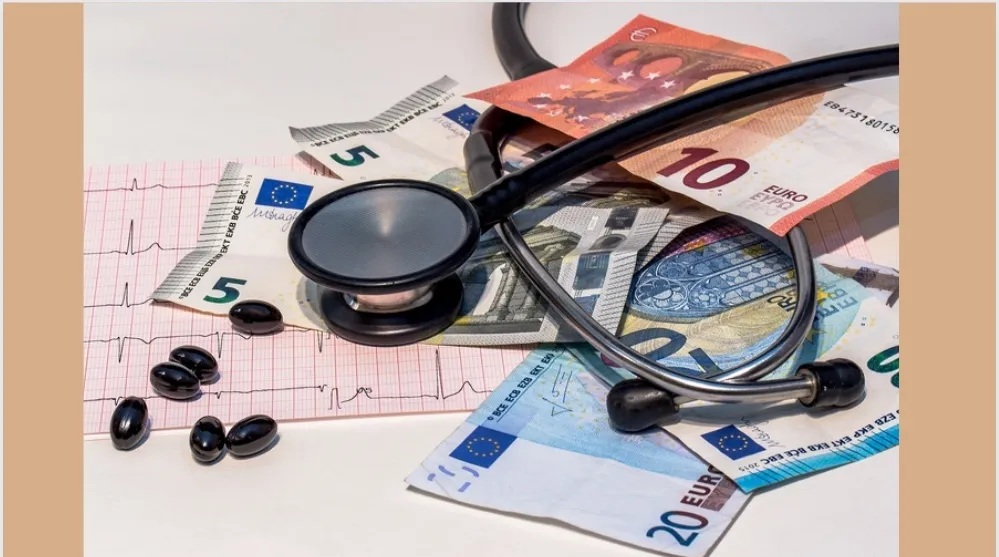 [Pixabay] cortesía de Myriams-Fotos
[Pixabay] cortesía de Myriams-FotosLA PESADILLA COMENZABA
Finalmente llegamos al hospital, con los nervios alterados, muy muy asustados por ver la condición en la que mi suegro se encontraba, el hospital debería significar para cualquiera un lugar de esperanza, donde se espera que alguien con conocimientos ayude, que den un diagnóstico, que atienda, que disipe los miedos y calme la angustia… pero la realidad a la que nos enfrentaríamos sería otra.
El primer contacto al bajarme en la entrada de la emergencia, fue lo que acá llaman un miliciano, son personas generalmente mayores de 40 años quienes les dan uniformes y entrenamientos militares muy deficientes, son algo así como civiles con uniforme pues no tienen cursos ni educación militar formal. Llegamos con nuestra angustia, esperando ilusamente que nos brindarían apoyo, le indiqué al miliciano con voz y manos temblorosas la situación de mi suegro, necesitábamos una silla de ruedas para poder sacarlo del carro y llevarlo dentro, para lo cual de una manera muy fría y sin ningún tipo de empatía me respondió: En el hospital no tenemos silla de ruedas... Me quedé un rato en frente de él esperando algo sucediera... Y si, algo sucedió… me dijo que por favor me apartara que obstaculizaba el paso...
WoW yo quedé como en shock y me dije a mis adentros: ¿Esto es en serio? ... No lo podía creer, mi suegro grave en el carro y a este señor trabajador de un centro asistencial parecía sencillamente no importarle. Yo tenía a un conocido del hospital y finalmente luego como de 3 horas de tener a mi suegro dentro del carro bajo una temperatura bastante alta por la condición de isla, llegó una silla de ruedas. Con mucha dificultad lo sacamos del carro y como se pudo se sentó en la silla de ruedas.
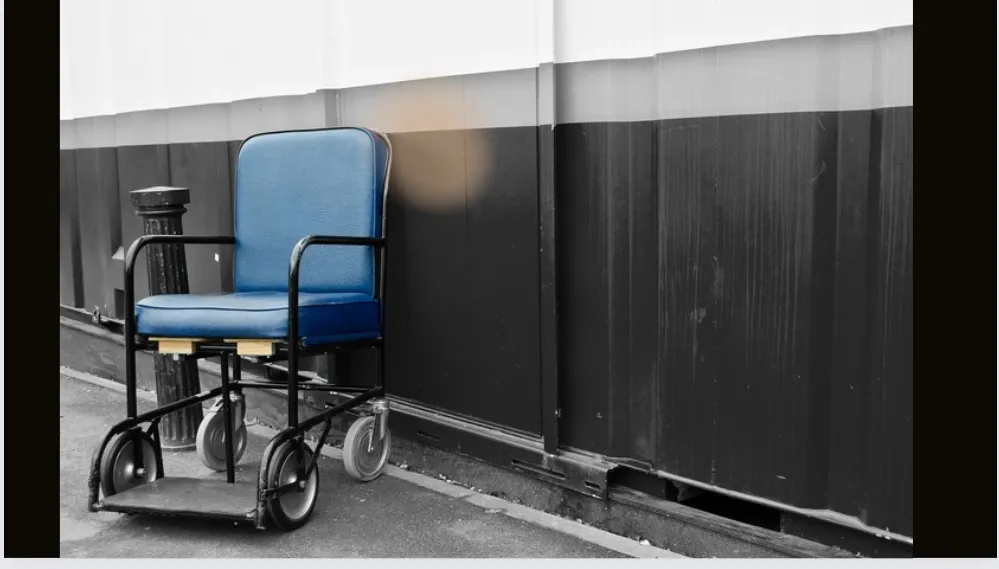 [Pixabay] cortesía de PublicDomainPictures
[Pixabay] cortesía de PublicDomainPicturesYA ESTAMOS EN EL HOSPITAL
Pensábamos ilusamente que ya lo peor había pasado, pero lo que no nos me esperábamos era lo que venía a continuación, resulta que no había ningún lugar de emergencia dónde algún médico lo atendiera o por lo menos le diera unos primeros auxilios, ¿no se? verificar de pronto que no estuviera empeorando o por lo menos una mano en el hombro que transmitiera un poco de tranquilidad.
El chico que trajo la silla nos dijo que debíamos dejarlo allí… yo volteo a todos lados y resulta que estábamos en un tipo salita de espera, pero para nuestra impresión habían pacientes tirados en el suelo, recibiendo suero u otro tratamiento, era aterrador lo que vimos, además no había ni un médico ni un enfermero que nos recibiera. Por un esquina encontramos una silla bastante frágil y bueno allí tocó sentar a mi suegro, la imagen de ese lugar era deprimente, allí estábamos mi esposo mi suegro y yo sin nadie que nos atendiera.
Mi esposo al ver la situación comenzó a sentirse mal, en ese momento llega una médico y le pedí ayuda para mi esposo, afortunadamente se acercó a nosotros, lo sentó en una silla y le tomaron la tensión… estaba presentando una crisis hipertensiva para completar.
No lo podía creer, ahora estaba con dos pacientes; y mientras mi esposo estaba intentando pasar su crisis hipertensiva luego de que le suministraran una pastilla, yo me encontraba luchando con el cuerpo débil y pesado de mi suegro que por falta de fuerza segundo a segundo se resbalaba y se iba hacia abajo, con mis pocas fuerzas lo tomaba de los hombros y lo intentaba subir pero la silla tan liviana se venía y hacía que todo el esfuerzo que yo hacía quedará en vano y prácticamente volvía a quedar igual o hasta peor. Luego de tanta lucha un enfermero se apiadó de mí y vino a ayudarme, por un segundo mientras mi suegro estaba nuevamente sentado caminé hacia un pasillo y solo me puse a llorar... Pensaba se me mueren acá los dos y no hay nadie que haga nada.
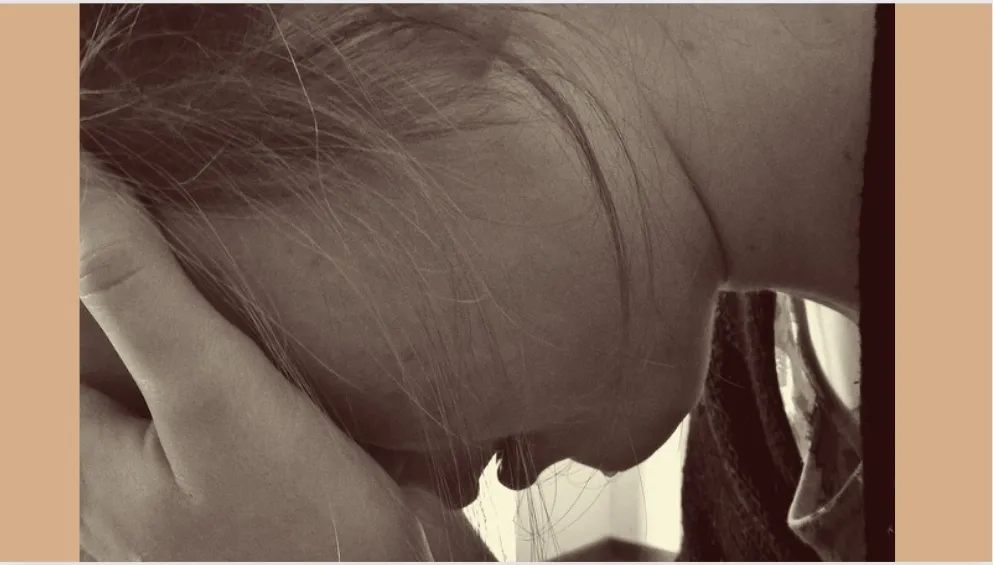 [Pixabay] cortesía de counselling
[Pixabay] cortesía de counselling
Al rato la doctora que había atendido a mi esposo se acercó, le expliqué lo que ocurría, ella ni lo tocó , ni revisó, solo me dijo: debe hacerle una tomografía para verificar que no sea otro ACV...yo nuevamente entré en shock, ya que, en el hospital no hacen tomografías, las debía hacer en un privado y eso tenía un costo de 100$ (lo sabíamos pues hace unas semanas ya se le había hecho una), pero esta vez no teníamos el dinero, ¿de dónde sacar 100$ para el examen? . Aunado a eso estaba la realidad de que mi esposo tenía una crisis hipertensiva, se encontraba débil y no era prudente levantara peso ni hiciera esfuerzos mayores y para completar el cuadro aterrador no había silla de ruedas para sacar a mi suegro del hospital. En medio del desastre apareció una silla de ruedas, prestada por el familiar de un paciente que nos vio en la desesperación, un enfermero ayudó a colocarlo y finalmente salimos del hospital.
OTRA VEZ EN EL PRINCIPIO
Si, en el carro sin los 100$ y con mi suegro sufriendo, pensamos: estamos otra vez como en el principio. En un momento debido a la frustración nos pasó por la cabeza irnos a casa y que ocurriera lo que tenía que ocurrir, si mi suegro moría por lo menos sería en su casa, en forma cálida y con sus seres queridos a su lado. Pero rápidamente volvimos en sí y seguimos la lucha, comenzamos a buscar quien nos pudiera ayudar y nos prestaran dinero para hacer la tomografía y cómo Dios no nos desampara, un amigo nos donó y de inmediato fuimos a una clínica a realizarle el examen.
Llegamos a la clínica y la diferencia era abismal, al estacionar nuestro carro frente a la entrada de emergencia salió rápidamente un camillero y al ver que mi suegro ya ni en silla de ruedas podía sostenerse entonces enviaron una camilla, instantáneamente llegó otro personal que ayudó al camillero a subir a mi suegro en la camilla. Comenzamos a entrar y adentro mientras recorríamos los pasillos para llegar a la sala de RX no pudimos evitar comparar allí todo estaba en orden, sin nadie tirado en el suelo recibiendo tratamiento o esperando lo atendieran, sin gente corriendo de un lado a otro, sin paredes sucias ni baños despidiendo mal olor…
Finalmente se le hizo la tomografía la cual según el propio chico que hizo, no arrojó un evento nuevo, lo que estaba viviendo mi suegro era consecuencia del primero, eso a pesar de todo nos dio cierta tranquilidad. Al salir de la clínica caímos nuevamente en la frustración y pensamos irnos a la casa, ¿qué sentido tendría volver a la línea de fuego?, es decir al hospital, donde no tendríamos un lugar ni nadie que lo atendiera, ni siquiera una silla de ruedas para llevarlo dentro… Fueron momentos de angustia, en nuestras manos estaba la decisión de la salud de mi suegro… y nosotros sin saber qué hacer. Las fuerzas del optimismo nuevamente nos llenaron y comenzamos a llamar a gente que quizá nos pudiera ayudar.
Afortunadamente y luego de varias llamadas un amigo nos indicó que podíamos ir al hospital, que ya se había encontrado un lugar en Observación de Adultos dónde lo podrían atender. Pero primero fuimos a casa a cambiarlo y a buscar una silla de ruedas que nos ofrecieron. Al final de la tarde de ese martes logramos ingresar al hospital y colocarlo en una cama en una sala de observación junto a 14 pacientes más.
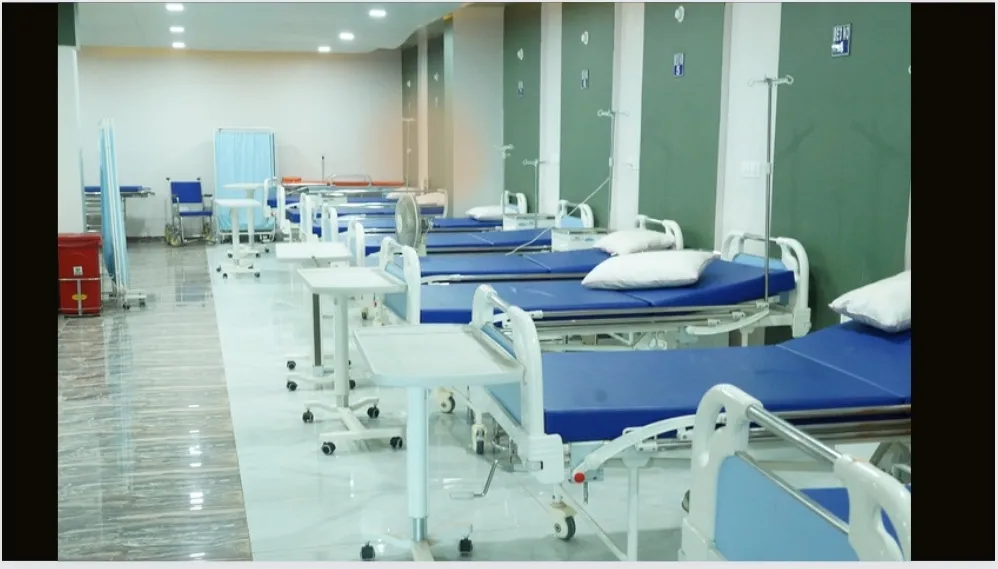 [Pixabay] cortesía de aslisubnash
[Pixabay] cortesía de aslisubnashLA ESTADIA
Entramos a una sala con muchos pacientes, en la puerta decía Observación de Adultos, llegamos en la silla de ruedas prestada y estuvimos en la puerta por alrededor de 10 minutos, pues una doctora estaba atendiendo a un paciente, cuando la doctora termina me dice: ¿y cuándo piensas acostar al paciente? Me quedé sorprendida pues yo no podía (o eso pensaba) llegar así por así a colocarlo en la cama, estaba esperando alguien me autorizara a hacerlo, allí otro maltrato más de los muchos que vendrían.
Comenzamos a vestir la cama donde acostaríamos a mi suegro, mientras eso ocurría mi vista se paseó por toda la sala: conté a 6 pacientes más, en algunas camas habían 1 o 2 familiares que acompañaban a los pacientes, en el fondo el sonido de algunas máquinas que monitoreaban las pulsaciones y por último una enfermera colocando un tratamiento a uno de ellos.
Como era un lugar de observación y dónde había otros pacientes, resulta que no se podía tener ni una silla, me explicaron que allí debían permanecer solo los objetos necesarios porque si se presentaba una emergencia no podía haber nada que obstaculizara el paso. Así que el acompañamiento sería de pie; como ya era de noche pregunté a la enfermera de guardia que cómo se hacía para dormir y me dijo que allí estaban los banquitos que se utilizan para subir o bajar de la cama y que los podía utilizar para sentarme y recostarme de la cama e intentar descansar. Y así pase la primera noche en el hospital, mi esposo por su parte la pasó afuera en el carro.
LA ODISEA
Allí comenzó nuestra odisea, iniciamos con el hecho de que mi suegro pasó 2 días en esa cama sin recibir atención de ningún médico, ellos entraban y salían y nuestra presencia parecía invisible, y preguntarles era en vano, ninguno me tomaba en consideración… ellos sólo seguían entrando y saliendo de esa sala.
Una mañana entró al fin un Dr. que notó nuestra presencia, fue él quien mandó finalmente a hacer la historia de mi suegro: le indicó algunos exámenes que se le debía hacer, para ese momento mi suegro se encontraba ya muy somnoliento y el Dr. Indicó colocarle una sonda nasogástrica para poder alimentarlo y darle sus medicinas.
 [Pixabay] cortesía de ckstockphoto
[Pixabay] cortesía de ckstockphoto
El drama aún no terminaba, nos tocaba vivir en carne propia eso que se denunciaba en las redes sobre la falta de recursos del Sector Salud en nuestro país. Pudimos constatar que en el hospital no se hace prácticamente ningún examen; para los exámenes de laboratorio por ejemplo, que eran diarios debíamos ir hasta un laboratorio privado de los muchos que estaban fuera del hospital, allí se pedían los frascos y nos devolvíamos al hospital, a esperar que alguna enfermera quisiera tomar la muestra, una vez tomada nos devolvíamos nuevamente al laboratorio y se cancelaba (15$ era el promedio en uno de los más baratos, en algunos laboratorios podía llegar a los 25$), se entregaban los frascos al laboratorio; nos regresábamos al hospital y en aproximadamente 2 horas íbamos nuevamente a buscar los resultados. Este proceso debía hacerse diario imaginen el desgaste físico y el gasto económico.
Para hacer un eco era otro proceso. El hospital no cuenta con este servicio y también debía ser por privado, además del costo que tenía dicho examen se nos presentaba otro problema adicional...¿cómo salíamos del hospital? Pues el hospital tampoco tiene ambulancia. Se debía llamar a Protección Civil o los bomberos y solicitar una ambulancia que coincidiera con la hora en que la clínica indicaba se haría el examen... Imagínense este proceso cada vez que se requería alguno de ellos. Los gastos durante 8 días en el hospital para estabilizar a mi suegro superaban los 900 $, monto que pudimos cubrir gracias a las donaciones que familiares y amigos hicieron.
ENTONCES… FALTA DE RECURSOS O FALTA DE HUMANIDAD
La falta de recursos era evidente, no habían inyectadoras, ni guantes, ni solución para colocar los tratamientos, no hacían exámenes de sangre, ni ecos ni Rayos X, entre otras cosas. Pero algo que me llamó muchísimo la atención era la forma tan fría y poco empática en que nos trataban médicos y enfermeras. Se suponía que las enfermeras debían hacer guardias para la colocación de los tratamientos, la realidad es que muchas veces no llegaban, si llegaban nos decían: espere un momento y ese momento significaba que nunca nunca nos atendían. Debido a eso y para tratar de cumplir su tratamiento a la hora, mi esposo aprendió a colocarlos y cómo mi hermano es enfermero le daba las instrucciones por teléfono.
Cuando me acercaba a algún doctor para preguntar algo, la gran mayoría nunca veían mi cara, ellos mientras yo hablaba simplemente seguían escribiendo o haciendo lo que estuvieran haciendo, siempre con una distancia, una frialdad, como si evitaran a toda costa un acercamiento emocional con los pacientes o con sus familiares. Estaban tan cerca pero tan lejos a la vez. Y es allí cuando me hacía la reflexión: evidentemente existe una falta de recurso material, pero es tan triste de que se le sume una escasez de humanidad, de cordialidad, de acercamiento por parte de los médicos.
Si no hubiese silla donde sentar al paciente, ni medicina para atenderlo, ni lugar para acostarlo, pero hubiese una voz cálida que intentara calmar tu miedo, una mano que se posara en tu hombro, que te transmitiera un poco de apoyo, un poco de esperanza, un poco de Fe en medio del caos, estoy segura que eso y solo eso haría más llevadera la pesadilla que sufrimos familiares y pacientes durante nuestro proceso…
Mi suegro 8 meses después de aquel horrible episodio luego de lo que yo considero una recuperación milagrosa, nuevamente está hablando y caminando en su casa junto a su familia.
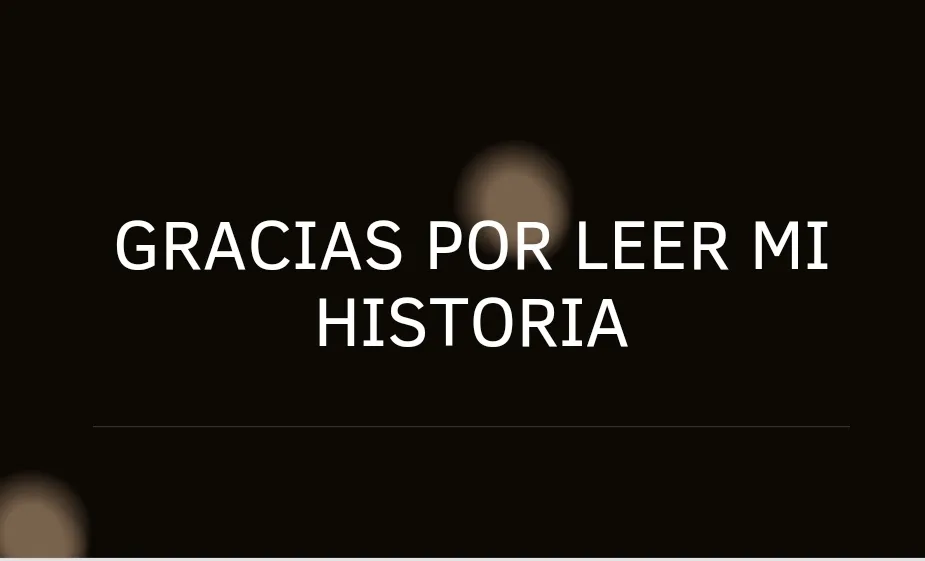
 [Pixabay] courtesy of 12019
[Pixabay] courtesy of 12019
Living in Venezuela for some years now has been quite complex. From my perspective, there are two realities: one reality is that of those whose income allows them to satisfy their needs and the other is that of those whose income simply does not, and I am in the latter.
Today I want to share my terrifying experience that my husband and my father-in-law and I lived in the Central Hospital of my beloved island.
My father-in-law is an 80 year old man, all his life he has been taking care of his heart because since he was very young he suffered from blood pressure, some of his arteries are clogged, some years ago he had an intervention to try to unclog them, he has suffered 2 heart attacks, in conclusion he is a patient who requires constant care. During the last few years, he no longer visited the cardiologist, because the consultations are quite expensive, his medicines have decreased in quality and he has bought the cheapest ones, in short, the economic situation really did not allow us to give him a preventive review of his cardiovascular situation.
One fine day, my father-in-law began to feel that the left side of his body was falling asleep, he could not move half of his mouth, he had no strength in his arm or leg. Our neighbor, who is a doctor, attended him and prescribed him some medicines and ordered a CAT scan. Indeed, the CT scan showed a transient ischemic stroke. That means from what I understood that the consequences might not be so serious. Little by little his body was gaining strength and mobility, which gave us peace of mind.
After a few days, my father-in-law approached us one afternoon and told us that he was losing strength in his legs, we took care of him and sat him on the living room sofa and while he was talking we noticed that he was having difficulty speaking, we gave him water and he could hardly swallow it. His condition was getting worse by the minute and we didn't know what was going on or if he was ok.
We got to a point where he could no longer talk or even sit up, he was going to the side, he was no longer in control of his body. All of this happened in less than 1 hour. We obviously decided to take him to an assistance center, it had to be the main hospital due to the seriousness of his condition (or at least for us to see him like that was serious).
My husband and I left with my father-in-law in the car, it was extremely difficult to get him into the vehicle, my husband had to carry him and between rough maneuvers we finally managed to get him in, the drive from the house to the hospital is about 20 minutes, very long minutes and the hospital seemed unreachable. I went in the back with him, as he could not stand on his own. Every minute that passed his physical and motor condition was getting worse.
Now, it turns out that getting sick in Venezuela is one of the worst things that can happen to you, in my country the public health service, in my opinion, is as if it were privatized, the lack of resources in hospitals forces patients to pay for even the smallest supplies that the patient needs, even the scalpels, the operating room clothes of the doctors if it is an operation, medicines, injectors, gloves ... and so on and so forth. That scared us a lot.
 [Pixabay] courtesy of Myriams-fotos
[Pixabay] courtesy of Myriams-fotosTHE NIGHTMARE BEGAN
Finally we arrived at the hospital, with our nerves altered, very very scared to see the condition in which my father-in-law was, the hospital should mean for anyone a place of hope, where you expect someone with knowledge to help, to give a diagnosis, to attend, to dispel the fears and calm the anguish ... but the reality that we would face would be another.
The first contact when I got off at the entrance of the emergency, was what they call here a militiaman, they are people generally over 40 years old who are given uniforms and very poor military training, they are something like civilians in uniform because they have no courses or formal military education. I told the militiaman with a trembling voice and hands the situation of my father-in-law, we needed a wheelchair to take him out of the car and take him inside, to which he replied in a very cold way and without any kind of empathy: In the hospital we do not have a wheelchair.... I stood in front of him for a while waiting for something to happen.... And yes, something happened... he told me to please get out of the way because I was in the way....
WoW, I was like in shock and I said to myself: Is this for real? I couldn't believe it, my father-in-law was in the car and this gentleman worker at a health care facility just didn't seem to care. I had an acquaintance from the hospital and finally after about 3 hours of having my father-in-law in the car under a very high temperature due to the island condition, a wheelchair arrived. With great difficulty we got him out of the car and as best we could he sat in the wheelchair.
 [Pixabay] courtesy of PublicDomainPictures
[Pixabay] courtesy of PublicDomainPicturesWE ARE ALREADY IN THE HOSPITAL
We deludedly thought that the worst was over, but what we did not expect was what was coming next, it turns out that there was no emergency place where a doctor could attend him or at least give him some first aid, I don't know? to verify that he was not getting worse or at least a hand on his shoulder to transmit a little peace of mind. The guy who brought the chair told us that we should leave it there... I look around and it turns out that we were in a kind of waiting room, but to our impression there were patients lying on the floor, receiving serum or other treatment, it was scary what we saw, plus there was neither a doctor nor a nurse to receive us. In one corner we found a very fragile chair and there we had to sit my father-in-law, the image of that place was depressing, my husband, my father-in-law and I were there with no one to take care of us.
My husband seeing the situation began to feel bad, at that moment a doctor arrived and I asked her for help for my husband, fortunately she came to us, sat him in a chair and took his blood pressure... he was having a hypertensive crisis to complete.
I could not believe it, now I was with two patients; and while my husband was trying to overcome his hypertensive crisis after being given a pill, I was struggling with the weak and heavy body of my father-in-law who, for lack of strength, was slipping and going down, with my little strength I grabbed him by the shoulders and tried to pull him up but the chair, so light, would come down and made all the effort I was making in vain and he was practically the same or even worse. After such a struggle a nurse took pity on me and came to help me, for a second while my father-in-law was sitting again I walked to a corridor and I just started to cry.... I thought, they are both dying here and there is no one to do anything.
 [Pixabay] courtesy of counselling
[Pixabay] courtesy of counsellingAfter a while the doctor who had attended my husband came over, I explained to her what was happening, she did not even touch him, nor did she check him, she just told me: he should have a CAT scan to verify that it was not another stroke... I was in shock again, since the hospital does not do CAT scans, they had to be done in a private hospital and that had a cost of $100 (we knew this because a few weeks ago he had already had one), but this time we did not have the money, where could we get $100 for the test...?
Added to that was the reality that my husband had a hypertensive crisis, he was weak and it was not prudent to lift weights or make major efforts and to complete the terrifying picture there was no wheelchair to take my father-in-law out of the hospital. In the midst of the disaster, a wheelchair appeared, lent by the relative of a patient who saw us in desperation, a nurse helped to place it and finally we left the hospital.
BACK TO SQUARE ONE
Yes, in the car without the $100 and with my father-in-law suffering, we thought: we are back to the beginning. At one point, out of frustration, it crossed our minds to go home and let what had to happen happen happen, if my father-in-law died, at least it would be at home, in a warm way and with his loved ones by his side. But we quickly came to our senses and continued the fight, we began to look for someone who could help us and lend us money to do the CAT scan and as God does not forsake us, a friend donated us and we immediately went to a clinic to perform the test.
We arrived at the clinic and the difference was abysmal, when we parked our car in front of the emergency entrance a stretcher-bearer came out quickly and when he saw that my father-in-law could not even stand up in a wheelchair, they sent a stretcher, instantly other personnel arrived and helped the stretcher-bearer to put my father-in-law on the stretcher. We started to go inside and as we walked through the corridors to get to the X-ray room we could not help comparing everything was in order, with no one lying on the floor receiving treatment or waiting to be treated, no people running from one side to the other, no dirty walls or smelly bathrooms....
Finally he had a CAT scan which, according to the guy who did it, did not show a new event, what my father-in-law was experiencing was a consequence of the first one, which, in spite of everything, gave us some peace of mind. When we left the clinic we fell into frustration again and thought about going home, what sense would it make to go back to the front line, that is, to the hospital, where we would not have a place or anyone to take care of him, not even a wheelchair to take him inside... Those were moments of anguish, the decision about my father-in-law's health was in our hands... and we did not know what to do. The forces of optimism filled us again and we began to call people who might be able to help us.
Fortunately, after several calls, a friend told us that we could go to the hospital, that a place had already been found in the Adult Observation Unit where he could be treated. But first we went home to change him and to look for a wheelchair that was offered to us. Late that Tuesday afternoon we were able to get him into the hospital and put him in a bed in an observation room with 14 other patients.
 [Pixabay] courtesy of aslisubnash
[Pixabay] courtesy of aslisubnashTHE STAY
We entered a room with many patients, on the door it said Adult Observation, we arrived in the borrowed wheelchair and we were at the door for about 10 minutes, because a doctor was attending to a patient, when the doctor finishes she asks me: and when do you plan to put the patient to bed? I was surprised because I could not (or so I thought) just like that to put him in bed, I was waiting for someone to authorize me to do it, there was another mistreatment of the many that were to come.
We began to dress the bed where we would put my father-in-law to bed, while that was happening my sight wandered around the room: I counted 6 more patients, in some beds there were 1 or 2 relatives accompanying the patients, in the background the sound of some machines that monitored the pulses and finally a nurse placing a treatment to one of them.
As it was a place of observation and where there were other patients, it turned out that it was not possible to have even a chair, it was explained to me that only the necessary objects should remain there because if an emergency arose there could not be anything to obstruct the passage. Since it was already dark, I asked the nurse on duty how to sleep and she told me that there were the little benches that were used to get in and out of bed and that I could use them to sit down and lie down and try to rest. And so I spent the first night in the hospital, my husband spent it outside in the car.
THE ODYSSEY
There began our odyssey, we started with the fact that my father-in-law spent 2 days in that bed without receiving attention from any doctor, they went in and out and our presence seemed invisible, and asking them was in vain, none of them took me into consideration... they just kept going in and out of that room. One morning a doctor finally came in and noticed our presence, he was the one who finally ordered the history of my father-in-law: he indicated some tests to be done, by that time my father-in-law was already very sleepy and the doctor indicated to place a nasogastric tube in order to feed him and give him his medicines.
 [Pixabay] courtesy of ckstockphoto
[Pixabay] courtesy of ckstockphoto
The drama did not end yet, we had to live in our own flesh what was denounced in the networks about the lack of resources of the Health Sector in our country. We could see that in the hospital practically no tests are done; for laboratory tests for example, which were daily, we had to go to a private laboratory of the many that were outside the hospital, there we asked for the bottles and we returned to the hospital, waiting for a nurse to take the sample, once taken we returned again to the laboratory and paid (15$ was the average in one of the cheapest, in some laboratories it could reach 25$), the bottles were delivered to the laboratory; We would return to the hospital and in approximately 2 hours we would go back to get the results. This process had to be done daily, imagine the physical wear and tear and the economic expense.
To do an echo was another process. The hospital does not have this service and it also had to be done privately, in addition to the cost of this test, we had an additional problem...how did we get out of the hospital? Well, the hospital does not have an ambulance either. We had to call Civil Protection or the fire department and request an ambulance that would coincide with the time the clinic indicated the exam would take place.... Imagine this process every time one of them was required. The expenses for 8 days in the hospital to stabilize my father-in-law exceeded $900, an amount that we were able to cover thanks to the donations that family and friends made.
SO... LACK OF RESOURCES OR LACK OF HUMANITY
The lack of resources was evident, there were no injectors, no gloves, no solution to place the treatments, no blood tests, no echoes or X-rays, among other things. But something that really caught my attention was the cold and unempathetic way in which doctors and nurses treated us. The nurses were supposed to be on duty for the placement of treatments, the reality is that many times they did not arrive, if they did arrive they would tell us: wait a moment and that moment meant that they never attended us. Because of that and to try to comply with his treatment on time, my husband learned how to place them and since my brother is a nurse, he would give him the instructions over the phone.
When I approached a doctor to ask a question, most of them never saw my face, they just kept writing or doing whatever they were doing, always with a distance, a coldness, as if they avoided at all costs an emotional approach with the patients or their relatives. They were so close but so far away at the same time. And that is when I reflected: obviously there is a lack of material resources, but it is so sad that there is also a lack of humanity, of cordiality, of approachability on the part of the doctors.
If there were no chair to sit the patient, no medicine to attend him, no place to put him to bed, but there were a warm voice to try to calm your fear, a hand to rest on your shoulder, to transmit a little support, a little hope, a little faith in the midst of chaos, I am sure that this and only this would make the nightmare that we suffered, family and patients, during our process, more bearable....
My father-in-law 8 months after that horrible episode, after what I consider a miraculous recovery, is once again talking and walking at home with his family.
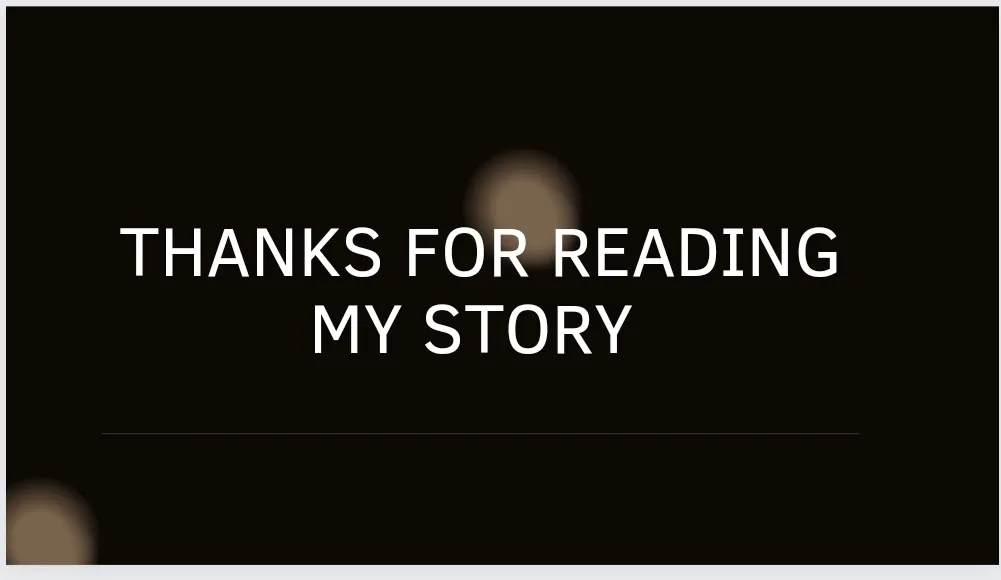
Fotografía por:| Photografy by: @baptistaeashell, Redmi 9T
Edición:| Edition by: @baptistaeashell, Canva, Picsart
Traducido con:| Translate with: www.Deepl.com/translator (free version)
